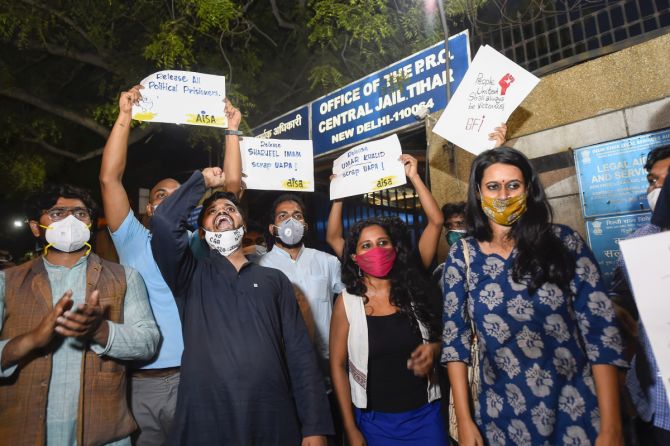The Supreme Court on Friday expressed its displeasure over the Delhi high court discussing the entire anti-terror law UAPA in a bail matter, and made it clear the high court's verdicts granting bail to three student activists in a north-east Delhi riots case will not be used as a precedent in any court in the country.

The top court, however, refused to stay the verdicts early this week on an appeal by the Delhi police.
"It is surprising that in a bail application, there is 100-page judgment discussing the entire law. That is what is troubling us.
"There are many questions which arise as legality of the UAPA was not challenged before the high court. These were bail applications," it observed.
The issue of reading down of UAPA (Unlawful Activities(Prevention) Act)is 'important' and can have 'pan-India ramifications', said a vacation bench of Justices Hemant Gupta and V Ramasubramanian, adding this law will require interpretation by the apex court.
The apex court agreed to hear the appeals filed by the Delhi Police challenging the verdicts of the high court and issued notices to JNU students Natasha Narwal and Devangana Kalita and Jamia student Asif Iqbal Tanha seeking their responses.
While refusing to stay the high court verdicts granting bail to the three accused, the bench said these judgements will not be treated as a precedent by any party before any court.
'In the meantime, the impugned judgment shall not be treated as a precedent and may not be relied upon by any of the parties in any of the proceedings. It is clarified that the release of the respondents (Narwal, Kalita and Tanha) on bail is not being interfered at this stage,' the bench said in its order.
'Issue notice,' it said, adding, 'Let the counter affidavits be filed within four weeks. List in the week commencing July 19, 2021 on a non-miscellaneous day.'
Taking note of Solicitor General Tushar Mehta's submission that the entire UAPA has been 'turned upside down' by the high court in granting bail in the case, the bench said, 'The issue is important and can have pan-India ramifications.'
'We would like to issue notice and hear the other side,' it added.
Mehta urged the apex court to stay the high court verdicts, saying the findings arrived at in these judgements "virtually record acquittal for these accused" and other accused would also seek bail relying on them.
'The way the Act has been interpreted, probably it will require interpretation by the Supreme Court. That is why we are issuing notice,' the bench said.
Senior advocate Kapil Sibal, appearing for the student activists, said there is no doubt that the apex court should consider the ramifications and interpretation of the UAPA so that there is a judgment on the issue from the top court.
At the outset, Mehta referred to the judgments of the high court and said, 'the entire UAPA has been turned upside down on its head.'
Mehta said that 53 persons died and over 700 were injured during the riots which took place at a time when the then United States President and other dignitaries were here.
"The high court has made wide ranging observations," he said, adding, "They are out on bail, let them remain out but please stay the judgments."
"Stay by the Supreme Court has its own meaning," he said.
The high court had said although the definition of 'terrorist act' in section 15 of the UAPA is wide and somewhat vague, it must partake the essential character of terrorism and the phrase 'terrorist act' cannot be permitted to be applied in a 'cavalier manner' to criminal acts that squarely fall under the Indian Penal Code.
The Delhi police assailed the verdict, saying the interpretation of the high court would weaken the prosecution in terror cases.
The Delhi police further contended in its appeal that the high court had said the UAPA provisions can only be applied to deal with matters of profound impact on the 'Defence of India', nothing more and nothing less.
While reading down some paragraphs from the high court verdicts regarding the right to protest, Mehta said, "If we go by this judgement, even the lady who assassinated the former prime minister was also protesting".
"Kindly stay these orders," he told the bench.
Sibal said the student activists also have a lot to argue in the matter.
The high court had on June 15 granted bail to the three student activists saying in an anxiety to suppress dissent the State has blurred the line between right to protest and terrorist activity and if such a mindset gains traction, it would be a 'sad day for democracy'.
The high court, in three separate judgments, set aside the trial court's orders denying bail to these student activists and allowed their appeals by admitting them to regular bail on furnishing a personal bond of Rs 50,000 each along with two sureties of the like amount.
These three student activists were released from jail on June 17.
The case relates to the last year's communal violence in north-east Delhi during protests against the Citizenship Amendment Act (CAA).
In its three separate appeals filed in the apex court, the Delhi Police has said that the high court's findings are 'perverse and contrary to record' and appeared to be based 'more on the social media narrative than the evidence gathered and elaborated in the charge sheet'.
In the appeals, the police has dubbed the verdicts as 'mini trial' and said such observations were unfounded and perverse insinuation.
The Delhi Police contended that bail was granted to the accused on an irrelevant consideration which will have far reaching consequences for cases investigated by NIA and other probe agencies.
The high court 'not only conducted a mini-trial but has also recorded perverse findings which are contrary to record' and almost decided the case while adjudicating bail pleas, said the police while seeking to set aside the three bail verdicts.
Kalita, Narwal and Tanha are accused in four, three and two cases respectively relating to communal riots that broke out on February 24 last year.
- What the Delhi high court said in the bail order of Natasha Narwal, Devangana Kalita and Asif Iqbal Tanha











 © 2025
© 2025